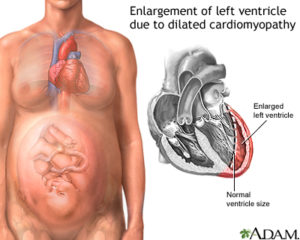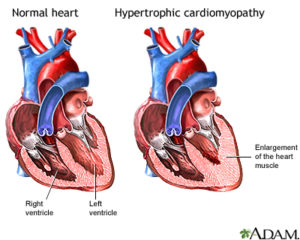Cardiomyopathy |
||
DefinitionCardiomyopathy is disease in which the heart muscle becomes weakened, stretched, or has another structural problem. It often occurs when the heart cannot pump or function well. Most people with cardiomyopathy have heart failure. CausesThere are many types of cardiomyopathy, with different causes. Some of the more common ones are:
TreatmentWhen possible, the cause of cardiomyopathy is treated. Medicines and lifestyle changes are often needed to treat the symptoms of heart failure, angina and abnormal heart rhythms. Procedures or surgeries may also be used, including:
Recently, implantable artificial heart pumps have been developed. These may be used for very severe cases. However, not all people need or are able to have this advanced treatment. Outlook (Prognosis)The outlook depends on many different things, including:
Heart failure is most often a long-term (chronic) illness. It may get worse over time. Some people develop severe heart failure. In this case, medicines, surgery, and other treatments may no longer help. People with certain types of cardiomyopathy are at risk for dangerous heart rhythm problems. ReferencesFalk RH, Hershberger RE. The dilated, restrictive, and infiltrative cardiomyopathies. In: Bonow RO, Mann DL, Zipes DP, Libby P, Braunwald E, eds. Braunwald’s Heart Disease: A Textbook of Cardiovascular Medicine. 10th ed. Philadelphia, PA: Elsevier Saunders; 2015:chap 65. McKenna WJ, Elliott P. Diseases of the myocardium and endocardium. In Goldman L, Schafer AI, eds. Goldman’s Cecil Medicine. 25th ed. Philadelphia, PA: Elsevier Saunders; 2016:chap 60. McMurray JJV, Pfeffer MA. Heart failure: management and diagnosis. In Goldman L, Schafer AI, eds. Goldman’s Cecil Medicine. 25th ed. Philadelphia, PA: Elsevier Saunders; 2016:chap 59. O’Connor CM, Rogers JG. Heart failure: pathophysiology and diagnosis. In Goldman L, Schafer AI, eds. Goldman’s Cecil Medicine. 25th ed. Philadelphia, PA: Elsevier Saunders; 2016:chap 58. |


